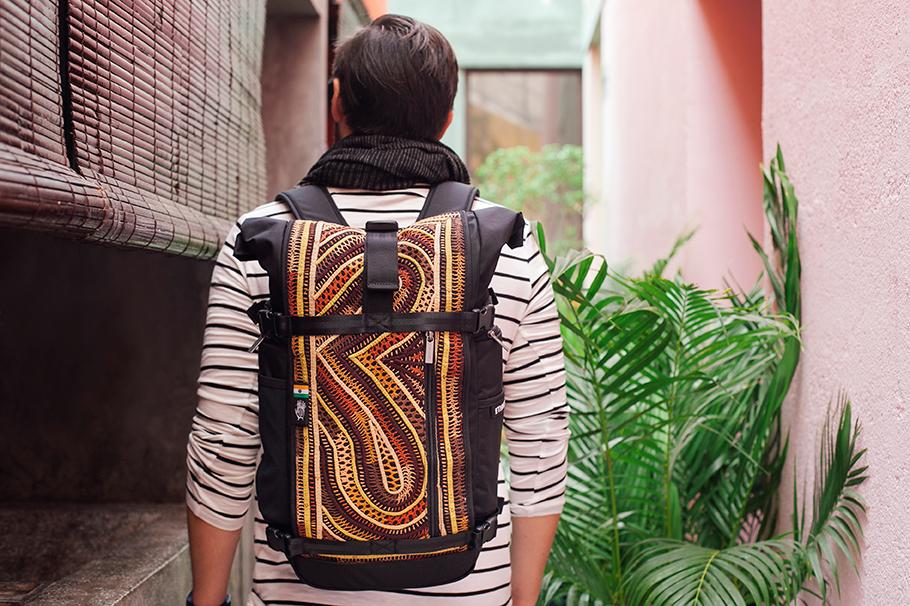If you want to talk full time camping, you need to talk to the Rabari. For thousands of years, these people have lived a nomadic existence in northern India, near Pakistan. This region is known as the Indus Valley, which was one of the first cradles of civilization. According to myth, Shiva put them on earth to tend to the camels owned by Parvati, one of the mother goddesses of the Hindu faith. The Rabari migrate as much as they always have, crisscrossing the deserts of Kutch, tending their camels and other livestock. To celebrate these original full-time campers, Ethnotek released a series of Rabari camping backpacks that showcase their traditional embroidery style.
The Rabari are renowned for their textile manufacturing. It only makes sense that a people who follow the grazing patterns of goats and sheep would be experts at spinning, weaving, and embroidering their wool into complex masterpieces that are both beautiful and functional. Indeed, much of what the Rabari people own are embroidered goods— the tents they camp under in the Kutch desert, the saddles for their camels, the quilts they wrap themselves in at night, their clothing, the covers for their water bladders. When you’re used to outdoor gear made from neon-bright water repellent fabrics, it’s easy to forget just how long humans have been making practical things to use in the outdoors, and how lovely those objects can be.
Backpacks that Celebrate Textile Traditions
Part of what makes the Rabari textiles so special are the ways they tell the story of a place, and what the Kutch desert means to the people who know it more intimately than anyone else. Their embroidery is expressive of Rabari myths and the stories they have passed down around campfires for generations. The colors and patterns evoke the landscape they love and rely upon for survival. This is a style of embroidery that has evolved over thousands of years.
That’s why Ethnotek partnered with Rabari textile makers for a new limited-edition series of travel backpacks. Ethnotek showcases textile designs from regions all over the world, and their backpacks are designed so you can swap out different weaving styles depending on your mood or where you’ve traveled. The Rabari collection is extra special, because just 120 pieces were created by 12 Rabari women over a period of three months.
If you like the sound of gear that is as much about narrative as it is about function and aesthetic, you might like not only the Rabari Ethnotek backpacks, but their other lines, too. Each collection helps communities with long-standing textile traditions to pass along those techniques and patterns, and to ultimately preserve their craft in an era when rural, old-school ways of living are quickly dwindling. These backpacks are a chance to share the Rabari story with the world, while you continue your own journey, and they theirs.
Next time you head outside, think of just how long we humans have existed in nature, attuning ourselves to the seasons, seeking help and sustenance from plants and animals, navigating difficult terrain, reading the stars, and feeling the sun on our cheeks. Think of your first hike, whether your parents took you out on the trail or something inspired you to go later in life. Consider where home is for you, and the places you’ve discovered through travel that left and impression. What story do your travels and passport stamps and campground reviews tell? After all, everyone has a place they are a part of, and which is a part of them. That’s a truth worth celebrating.
You can win free gear from Ethnotek and 19 other outdoor brands by reviewing campgrounds on The Dyrt. Share past camping experiences, photos, and videos to earn points towards monthly prizes in The 2018 Great Camping Giveaway!
The Dyrt is the only camping app with all of the public and private campgrounds, RV parks, and free camping locations in the United States. Download now for iOS and Android.Popular Articles:
Articles on The Dyrt Magazine may contain links to affiliate websites. The Dyrt receives an affiliate commission for any purchases made by using such links at no additional cost to you the consumer.



